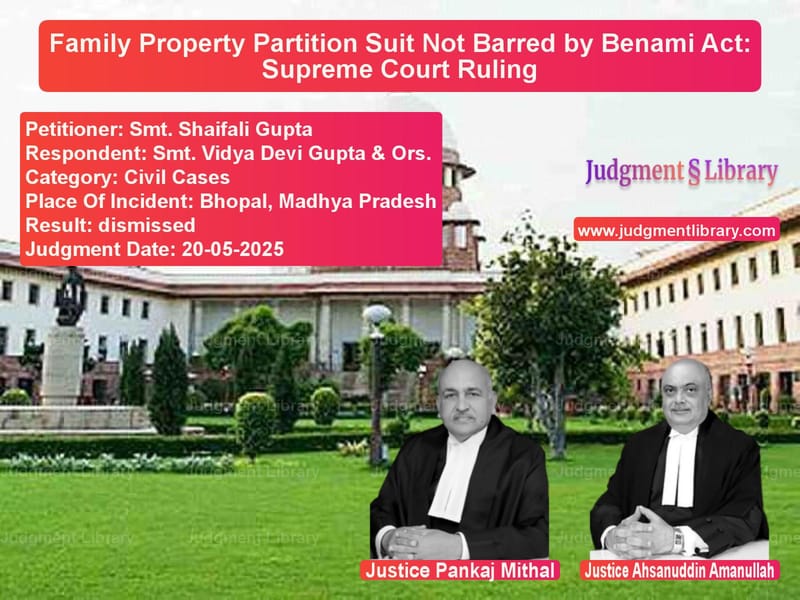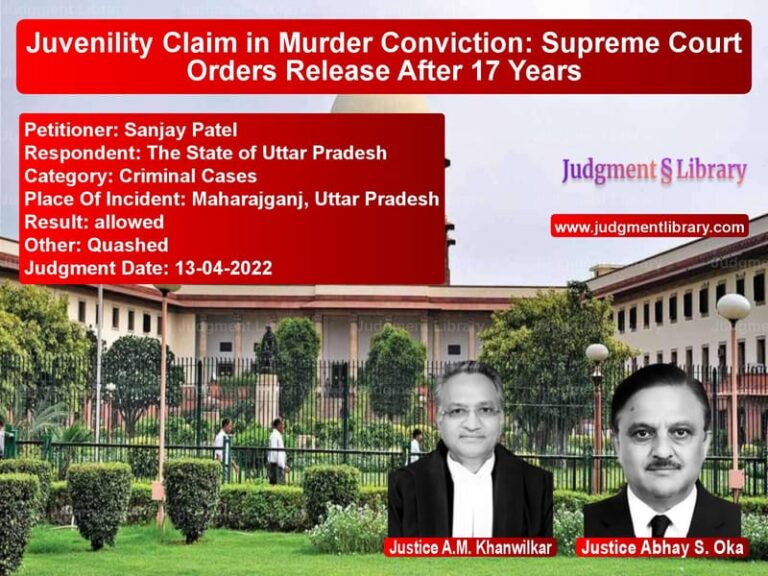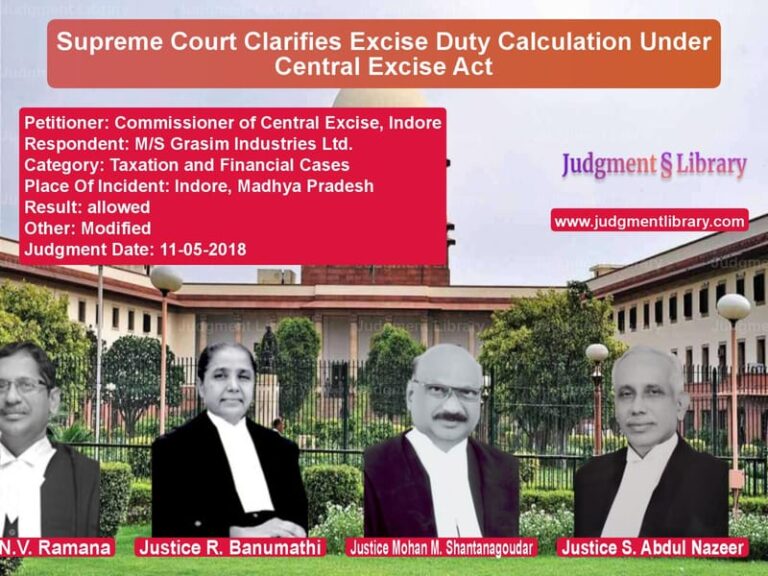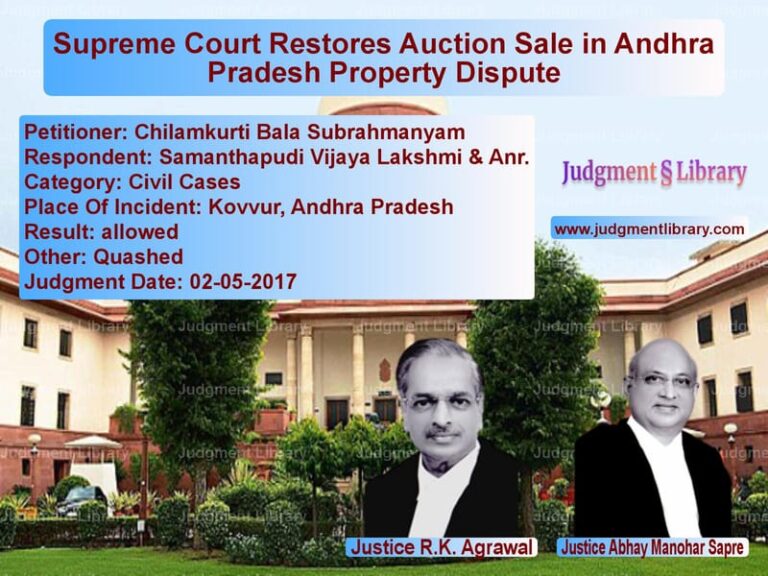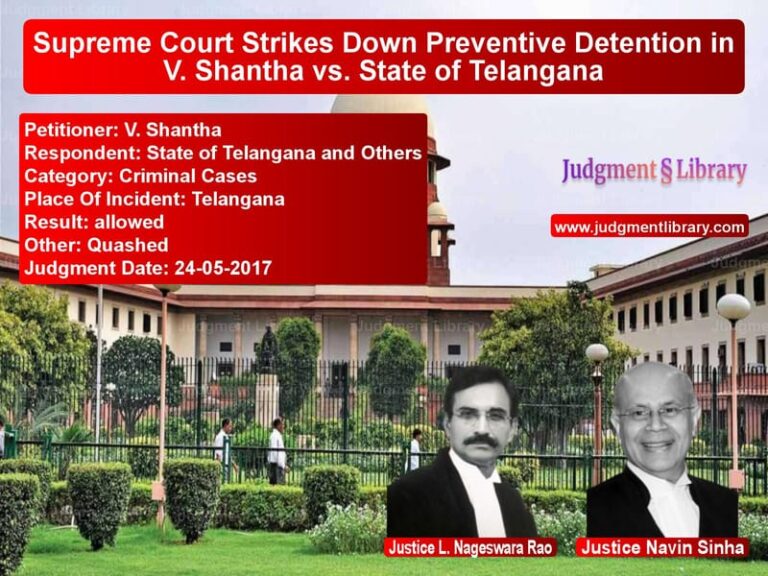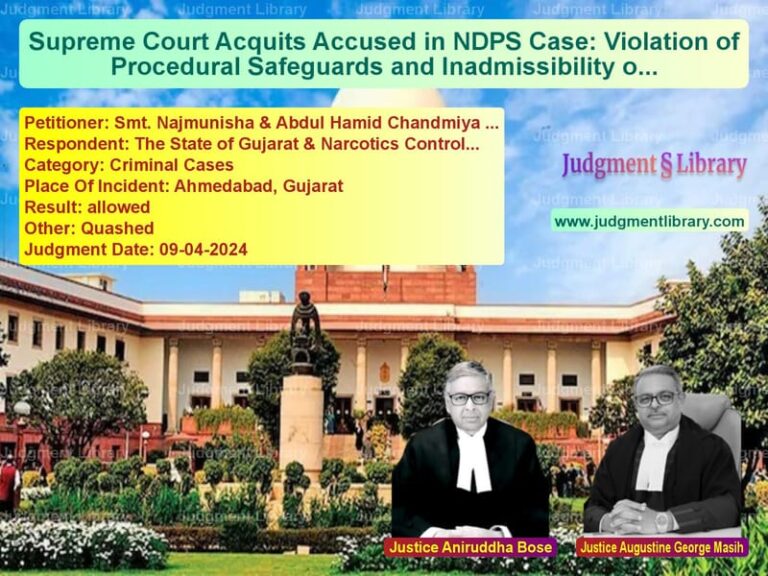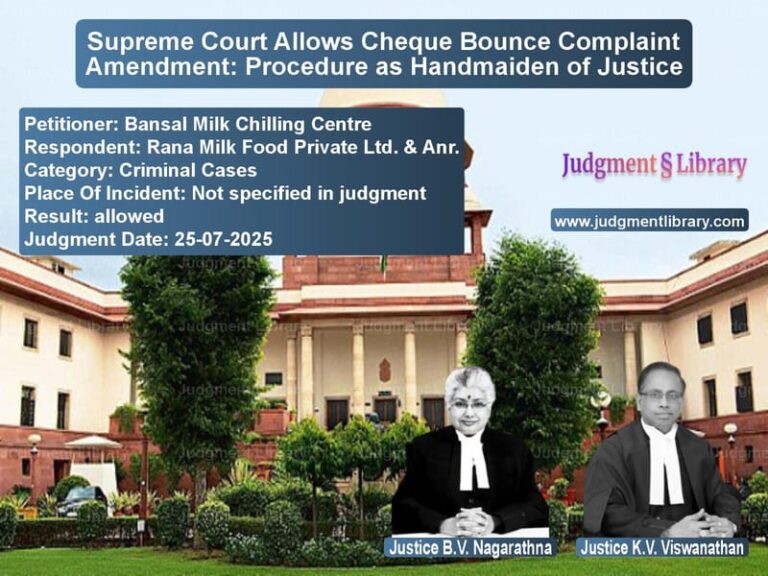Family Property Partition Suit Not Barred by Benami Act: Supreme Court Ruling
In a significant judgment that clarifies the relationship between family property disputes and the Benami Transactions Act, the Supreme Court of India has upheld the maintainability of a partition suit filed by family members claiming joint ownership of properties allegedly purchased from joint family funds. The ruling, delivered on May 20, 2025, emphasizes that complex family property disputes involving questions of joint family ownership cannot be summarily dismissed at the threshold under Order VII Rule 11 of the Civil Procedure Code.
The case involved a deeply divided family where a mother, Vidya Devi Gupta, and her younger son, Sudeep Gupta, filed a suit against the elder son, Sandeep Gupta, his wife Shaifali Gupta, and their children, along with subsequent purchasers of some disputed properties. The suit sought partition, possession, declaration, mandatory and permanent injunction, and accounting for properties alleged to be family properties purchased from joint family funds or derived from joint family business income.
The Family Business and Property History
The family’s story began with Shanti Prakash Gupta, who ran a tailoring business until his death in 1977, leaving no immovable or movable property. In 1982, his two sons jointly started a tailoring business called ‘Himalaya Tailors’ from a rented shop in New Market, TT Nagar, Bhopal, using funds from selling their mother’s jewellery. Although both brothers worked together in the business, the younger brother was appointed as the sole proprietor.
The family purchased their first house in Harshwardhan Nagar around 1990 and lived there jointly until approximately 2011. Meanwhile, the elder son started a separate fabric business called Hemi Textiles in 1986. From the combined income of both businesses, the family purchased a shop in New Market, TT Nagar, Bhopal, and several other properties registered in the names of different family members.
The plaint specifically alleged that “all the properties were purchased out of the joint family funds or the income derived from the joint family business” and that “the properties have been purchased in the name of the plaintiffs and the defendants or the members of the family and were the joint properties of the Joint Hindu Family.” The suit became necessary when Shaifali Gupta (defendant No. 2) sold three of these properties to Deepak Lalchandani and Surya Prakash Mishra (defendant Nos. 5 and 6), which the plaintiffs claimed were void sales as the properties belonged to the joint family.
The Legal Challenge Under Order VII Rule 11 CPC
The subsequent purchasers (defendant Nos. 5 and 6) filed an application under Order VII Rule 11 of the Civil Procedure Code, contending that the suit was not maintainable due to the provisions of the Benami Transactions (Prohibition) Act, 1988. Notably, the main contesting defendants—the elder brother and his family members—never raised this objection and never alleged that the suit was barred by any statutory provision.
The plaintiffs contested this application, arguing that the Benami Act (as amended in 2016) came into force on January 11, 2016, while all family properties were purchased before this date. They maintained that “the suit is not for adjudication of any matter in relation to benami transaction as envisaged in the Benami Act rather it is a suit essentially under the Hindu Succession Act, 1956.” They further contended that “the suit properties are Hindu Joint Family properties and the relief claimed in the suit is purely in respect of the said properties and as such it does not stand prohibited by the Benami Act.”
The trial court rejected the application after elaborately discussing the plaint averments, concluding that whether the suit properties were Joint Hindu Family properties or individual properties was a question dependent on facts to be adjudicated after evidence. The court held that on the basis of plaint averments alone, the suit was not barred by any law.
When the subsequent purchasers filed a civil revision, the High Court dismissed it, holding that “the trial court has rightly held that the issue as to whether the properties belong to the Joint Hindu Family properties or they have been purchased from the joint hindu family funds is to be proved by the parties on the basis of evidence.” The High Court agreed that “from the averments made therein it cannot be said that it is barred by any statutory provision of law.”
Arguments Before the Supreme Court
Before the Supreme Court, the petitioners advanced several arguments. Their counsel submitted that “the suit is barred by Section 4 read with Section 14 of the Act, as some of the suit properties are in the exclusive name of the defendant No.2 and as such would be treated in entirety as her personal properties and would not be amenable to partition.” They further argued that “the suit is hit by Section 4 of the Act” and that “since the properties stand exclusively in the name of different persons, no party can claim joint ownership or right of partition in respect thereof.”
In response, the plaintiffs’ senior counsel, Shri Kavin Gulati, submitted that “the bar of Section 4 read with 14 of the Act, was never raised by the defendants in their application under Order VII Rule 11 CPC and the said point was not argued on their behalf either before the court of first instance or before the High Court.” Therefore, they were not entitled to raise this plea for the first time before the Supreme Court.
He further argued that “the above provisions do not bar a suit of such a nature in respect of joint family property in any manner” and that “the suit is also not barred by Section 4 of the Act, as according to the plaint averments, all the properties were purchased from the nucleus of the joint family, may be in the exclusive name of some of the family members.” He pointed out that “they fall in the exempted category as per Section 2(9)(A) Exception (ii) of the Benami Act.”
Most importantly, he emphasized that “upon the simple reading of the plaint allegations, the suit is not barred by any provision of law and, therefore, Order VII Rule 11 (d) does not stand attracted so as to reject the plaint.” He concluded that “the defence or the issues raised by the defendants are factual in nature which are dependent upon the facts to be proved inter se the parties on the basis of the evidence to be adduced.”
The Supreme Court’s Legal Analysis
The Supreme Court began its analysis by examining Section 4 of the Benami Act, which states: “4(1). No suit, claim or action to enforce any right in respect of any property held benami against the person in whose name the property is held or against any other person shall lie by or on behalf of a person claiming to be the real owner of such property.”
The Court noted that “the above provision bars an action in respect of ‘property held benami’. However, whether the property in respect of which the suit, claim or action has been brought about is a benami property or not, is the issue of prime consideration.”
Examining the plaint allegations, the Court observed that “the plaint allegations all through describe the suit properties as the Joint Hindu Family properties and that they have been purchased either from the nucleus of the Joint Hindu Family property or the income derived from the joint family business. The properties are not described as benami in the name of any member of the family.” Therefore, “from the plaint reading, the suit properties cannot ex-facie be held to be benami properties in respect whereof the suit may not be maintainable in view of Section 4 of the Benami Act.”
The Court further analyzed the definitions under the Benami Act, noting that “whether a property is a benami, has to be considered not in the light of Section 4 of the Benami Act alone but also in connection with Sections 2 (8) and 2 (9) of the said Act i.e. whether the property if benami falls in the exception.” The Court emphasized that “it is only where the property is benami and does not fall within the exception contained in Sub-Section (9) of Section 2 that a suit may be said to be barred.”
Most significantly, the Court held that “the issue whether the property is benami and is not covered by the exception, is again an issue to be decided on the basis of evidence and not simply on mere averments contained in the plaint. The defendants have to adduce evidence to prove the property to be benami.”
Precedent and Legal Principles
The Supreme Court relied on its earlier decision in Pawan Kumar vs. Babu Lat, where a similar issue arose concerning rejection of plaint under Order VII Rule 11(d) CPC. The Court quoted the principle that “for rejecting a plaint, the test is whether from the statement made in the plaint it appears without doubt or dispute that the suit is barred by any statutory provision.” The earlier judgment had held that “where a plea is taken that the suit is saved by the exception to the benami transaction, it becomes the disputed question of fact which has to be adjudicated on the basis of the evidence. Therefore, the plaint cannot be rejected at the stage of consideration of application under Order VII Rule 11 CPC.”
The Court found that “the ratio of the above case squarely applies to the facts of the case at hand. Accordingly, in our opinion, the courts below have not committed any error of law in rejecting the application under Order VII Rule 11 CPC on the above score.”
Regarding the contention about Section 14 of the Hindu Succession Act, the Court noted that “no such specific plea was taken by the defendants in the application under Order VII Rule 11 CPC. Such a plea was never raised and argued before either of the courts below.” Therefore, the defendants could not be permitted to raise this plea for the first time in the Special Leave Petition without any foundation.
The Court further clarified that “Section 14 of the Act simply provides that the property possessed by a female Hindu shall be held by her as a full owner. It does not bar or prohibit a suit in respect of such a property. Therefore, in the absence of any bar contained in the above provision, the suit plaint is not liable to be rejected as barred by law.”
Procedural and Jurisdictional Aspects
The Court made important observations about the petitioners’ standing to file the appeals. Regarding Shaifali Gupta (defendant No. 2), the Court noted that “she had neither moved application under Order VII Rule 11 CPC for the rejection of the plaint nor she has filed any revision challenging the order of the court of first instance rejecting such an application moved by the defendant Nos.5 and 6.” Therefore, “she is not a person aggrieved by the rejection of the application under Order VII Rule 11 and cannot be permitted to assail the impugned orders. She has acquiesced to the jurisdiction of the trial court and has by her conduct accepted the order of the court of first instance and chosen to contest the suits on merits.”
Regarding the subsequent purchasers (defendant Nos. 5 and 6), the Court observed that “they are only subsequent purchasers of some of the properties. They cannot claim any knowledge of the nature of the property in the hands of the original owners. They cannot have any personal knowledge as to if the said properties in the hands of the original owners are Joint Hindu Family property or are their individual properties or they have been acquired benami by the family members or are the properties possessed by the female hindu in absolute sense.” Therefore, “they are not the right person to move application under Order VII Rule 11 CPC for the rejection of the plaint as allegedly barred by Section 4 of the Benami Act.”
The Final Ruling and Its Implications
The Supreme Court concluded that “the courts below have rejected the application filed by defendant Nos.5 and 6 under Order VII Rule 11 CPC and have refused to reject the plaint as barred by any statute. It means that the parties are at liberty to contest the suit on merits.” The defendants retained the right to “get the necessary relevant issues framed in the suit including that of suit being barred by any provision of law and if any such issue is framed, it will be open for the court to consider the same on merits after the parties have led evidence.”
The Court found that “in such a situation, the defendants have not suffered any prejudice and there is no miscarriage of justice so as to permit them to avail the discretionary jurisdiction of this Court under Article 136 of the Constitution of India.”
Accordingly, the Supreme Court dismissed both special leave petitions, allowing the partition suit to proceed to trial where all parties could present evidence regarding the true nature of the disputed properties. This judgment reinforces the principle that complex family property disputes involving questions of joint family ownership, benami transactions, and exceptions under the Benami Act require thorough evidentiary examination and cannot be decided summarily at the preliminary stage based solely on plaint allegations.
The ruling provides important clarity on the relationship between the Benami Transactions Act and Hindu family law, establishing that claims of joint family property ownership fall within recognized exceptions to the benami prohibition and must be properly adjudicated through full trial proceedings rather than being dismissed at the threshold.
Petitioner Name: Smt. Shaifali Gupta.Respondent Name: Smt. Vidya Devi Gupta & Ors..Judgment By: Justice Pankaj Mithal, Justice Ahsanuddin Amanullah.Place Of Incident: Bhopal, Madhya Pradesh.Judgment Date: 20-05-2025.Result: dismissed.
Don’t miss out on the full details! Download the complete judgment in PDF format below and gain valuable insights instantly!
Download Judgment: smt.-shaifali-gupta-vs-smt.-vidya-devi-gupt-supreme-court-of-india-judgment-dated-20-05-2025.pdf
Directly Download Judgment: Directly download this Judgment
See all petitions in Property Disputes
See all petitions in Succession and Wills
See all petitions in Contract Disputes
See all petitions in Specific Performance
See all petitions in Damages and Compensation
See all petitions in Judgment by Pankaj Mithal
See all petitions in Judgment by Ahsanuddin Amanullah
See all petitions in dismissed
See all petitions in supreme court of India judgments May 2025
See all petitions in 2025 judgments
See all posts in Civil Cases Category
See all allowed petitions in Civil Cases Category
See all Dismissed petitions in Civil Cases Category
See all partially allowed petitions in Civil Cases Category

